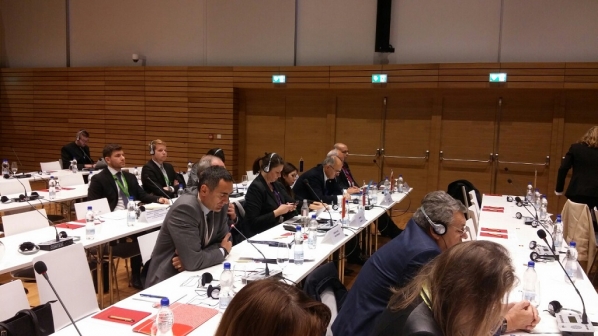Two-day Interparliamentary Conference on Stability, Economic Coordination and Governance in the European Union, organised within the parliamentary dimension of the semi-annual Slovak presidency of the Council of the European Union, ended in Belgrade today.
The second of the four sessions at the conference was devoted to fight against tax evasion in the EU. The participants pointed out that combating tax evasion and collection of taxes were not only European but also global priorities, bearing in mind that due to the lack of information on taxes and accounting of multinational companies and different tax jurisdictions, significant revenues were being lost. They pointed out that a proposal to amend the Directive on administrative cooperation in the field of taxation represented the central component of the Tax Transparency Package, with the aim of improving cooperation between member states in terms of their cross-border tax policy.
The session was moderated by Ms Dana Meager, State Secretary of the Ministry of Finance of the Slovak Republic, while the participants were addressed by: Mr Prem Sikka, Professor of Accounting and Director of the Centre for Global Accountability at the University of Essex, UK, Mr Bernardus Zuijdendorp, Head of Unit Company Taxation Initiatives at the Directorate-General for Taxation and Customs Union at the European Commission, Mr Richard Murphy, Professor of Practice in International Political Economy at City University London and Director of Tax Research, UK and Mr Mr Fabio De Masi, Vice-Chair of the Committee of Inquiry to investigate alleged contraventions and maladministration in the application of Union law in relation to money laundering, tax avoidance and tax evasion and member of the Committee on Economic and Monetary Affairs at the European Parliament.
The third session titled “Automatic Stabilisers as a Building Block of the Fiscal Union Architecture” was moderated by Mr Ivan Šramko, Chair of the Council for Budget Responsibility of the Republic of Slovakia. The participants were addressed by: Mr László Andor, Professor at the Economics Department at the Corvinus University of Budapest, Mr Marco Buti, Director-General at the Directorate-General for Economic and Financial Affairs at the European Commission, Ms Pervenche Berès, member of the Committee on Economic and Monetary Affairs at the European Parliament and Mr Jean Arthuis, Chair of the Committee on Budgets at the European Parliament and Mr Michal Polák,
General Government Counsel at the Ministry of Finance of the Slovak Republic. During the said session, they pointed out that member states had national fiscal policies at their disposal, in accordance with the rules of the Stability and Growth Pact, as well as that the lack of binding mechanisms for the EU or the eurozone made the national fiscal policies less effective in stabilizing domestic economic activity. In this regard, it was pointed out that a common European fiscal mechanisms were not sufficient to compensate for the lack of structural reforms of the member states.
Chairperson of the Committee for Economy, Finance and Budget Mr Aleksandar Damjanović, as a representative of the delegation of the Parliament of Montenegro, participated in the debate that followed the panelists’ addresses at a session devoted to automatic stabilizers.
During the conference, and within the fourth session, participants were focused on common investment programme as a tool for macroeconomic stabilisation in the EU. The session was moderated by Ms Katarína Cséfalvayová, Vice Chair of the European Affairs Committee of the National Council of the Slovak Republic, while the participants were addressed by: Mr Peter Kažimír, Chair of the Economic and Financial Affairs Council (ECOFIN) and Minister of Finance of the Slovak Republic, Mr Roberto Gualtieri, Chair of the Committee on Economic and Monetary Affairs, European Parliament, Mr Gerassimos Thomas, Chair of the Steering Board of the European Fund for Strategic Investment and Deputy Director-General at the Directorate-General for Energy at the European Commission, Ms Teresa Caeiro, Vice President of the Assembly of the Republic of Portugal and Mr Mr Andrew Watt, Head of the Macroeconomic Policy Institute of the Hans-Böckler Foundation. During this session, they pointed out that it was necessary to harmonize policies within the eurozone and at the EU level, bearing in mind that there was a lack of mechanisms for the absorption of financial shocks. With regard to that, faults of the single monetary policy were stressed, given that it was not relevant in situations when the eurozone was facing asymmetric shocks. Furthermore, the strategic importance of the European Fund for Strategic Investments (EFSI) was emphasised, which should contribute to strengthening of eurozone and EU fiscal capacity.









